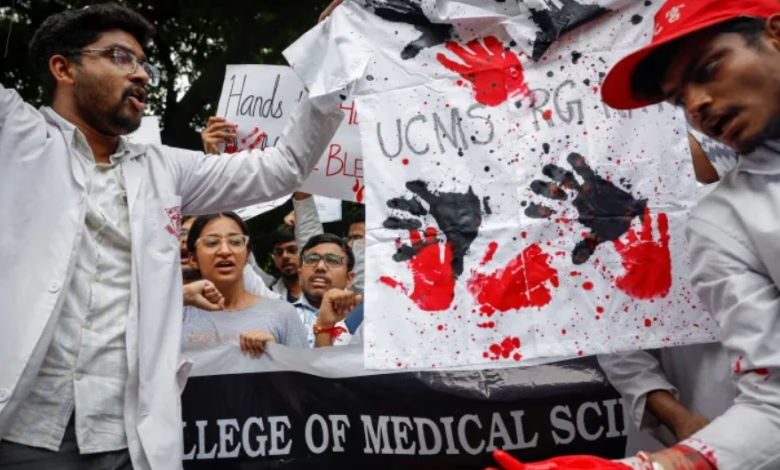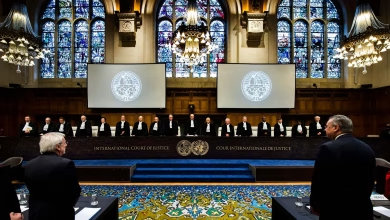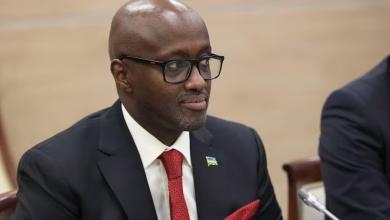Doctors in Kolkata Resume Strike, Call for Improved Safety Measures

- Kolkata doctors resumed their strike over the rape and murder of a female colleague.
- They demand improved safety measures, citing unfulfilled government promises.
- The incident has drawn comparisons to the 2012 Delhi gang rape case.
Doctors in Kolkata, India, have resumed their strike in response to the tragic rape and murder of a female colleague, escalating their protests to demand better safety measures in hospitals. The strike, which began on Tuesday, highlights the ongoing concerns regarding the security of healthcare professionals in the region.
The healthcare workers emphasized that their previous demands for improved safety protocols and protective measures in hospitals have not been adequately addressed. The incident that triggered this renewed action has sent shockwaves through the medical community, prompting doctors to advocate for a safer working environment.
Protesters have called for immediate action from the government and hospital administrations to enhance security measures and protect medical staff from violence and harassment. The strike has garnered widespread support from various medical associations, highlighting the critical need for systemic change within the healthcare system.
In addition to their safety concerns, the doctors are also pushing for a more robust response from law enforcement to protect healthcare workers and ensure accountability for such crimes. The striking doctors argue that without meaningful reforms, the safety of medical personnel will continue to be at risk.
As the strike continues, hospitals in Kolkata are facing significant disruptions, with many non-essential medical services being affected. Patients are urged to seek alternative care options, as healthcare workers remain committed to their cause, striving for justice and a safer work environment.
The situation remains tense as doctors maintain their stance, demanding a comprehensive approach to tackling violence against healthcare professionals. Their actions serve as a powerful reminder of the challenges faced by medical personnel in India and the urgent need for reform to protect those who dedicate their lives to saving others.
Doctors from the West Bengal Junior Doctors’ Front, representing approximately 7,000 physicians across the state, had resumed partial services last month due to the flooding crisis affecting various regions. However, the group has now made it clear that they are prepared to escalate their strike actions.
In a statement, the Junior Doctors’ Front emphasized that unless the government takes definitive steps to enhance safety, ensure patient services, and address the underlying “politics of fear,” they will have no option but to resume a full-scale strike. The doctors’ union continues to voice their concerns over the safety and well-being of medical personnel in light of recent incidents of violence against healthcare workers.
Their demand for action reflects a broader concern within the medical community regarding inadequate safety measures in hospitals. The doctors are calling for immediate government intervention to create a secure working environment for healthcare professionals.
The ongoing unrest has raised alarm within the healthcare system, with potential implications for patient care if the strike is expanded. The Junior Doctors’ Front is resolute in its stance, advocating for essential changes that prioritize the safety of medical staff while ensuring continued care for patients in need.
The tragic rape and murder of a 31-year-old female doctor in Kolkata, the capital of West Bengal, has sparked widespread protests among medical professionals who are calling for enhanced workplace safety for women and justice for their deceased colleague. In response to these outcries, India’s Supreme Court has established a hospital safety task force to address the pressing concerns raised by the medical community.
During a recent hearing on Monday, the Supreme Court urged the state government to implement all necessary measures to fulfill the doctors’ demands by October 15. This call to action highlights the urgent need for improvements in safety protocols within healthcare facilities to protect medical staff from violence and harassment. The court’s involvement signifies a recognition of the seriousness of the situation and the need for systemic change in the healthcare environment.
The protests reflect a growing awareness and determination among healthcare workers to advocate for their rights and safety in the workplace. As the doctors rally for change, they hope to prevent similar tragedies from occurring in the future.
Union spokesman Aniket Mahato stated that the West Bengal state government has not fulfilled its commitments to enhance security measures in hospitals, including upgrades to lighting and the installation of CCTV cameras.
“The state government has not ensured safety and security in the workplace,” Mahato told AFP news agency. He announced that doctors would take to the streets again on Tuesday night to urge the government to fulfill its commitments and seek justice for their murdered colleague.
Although the protests originated in Kolkata, they rapidly spread nationwide, reaching major regions such as the capital New Delhi, Uttar Pradesh, Bihar, and Maharashtra.
While one suspect has been detained in connection with the murder, the West Bengal government has faced public backlash regarding its management of the investigation.
In response to the growing unrest, authorities have dismissed the city’s police chief and senior health ministry officials.
The horrific details of the attack have drawn parallels to the 2012 gang rape and murder of a young woman on a Delhi bus, an incident that ignited weeks of protests across the nation.





